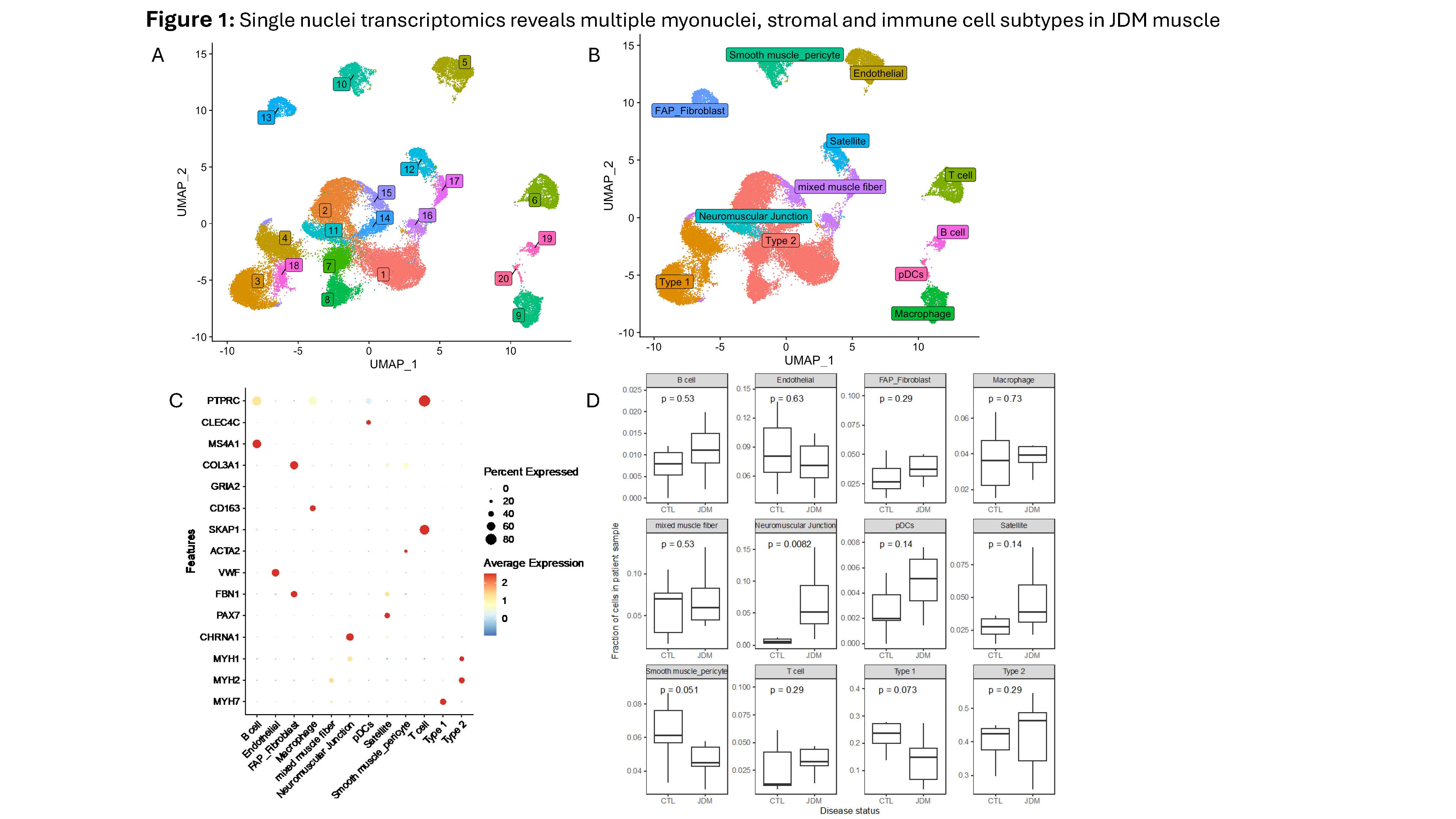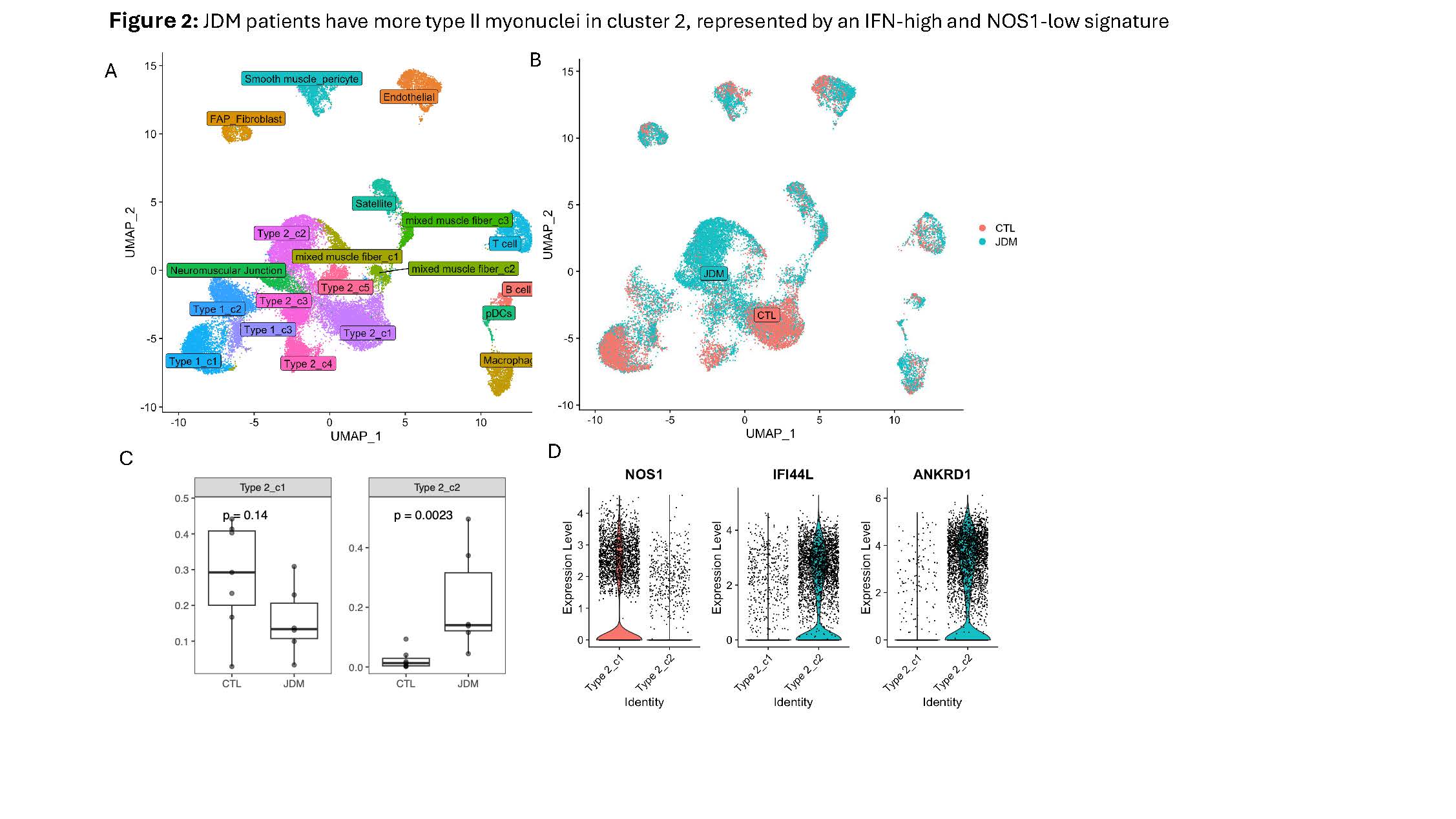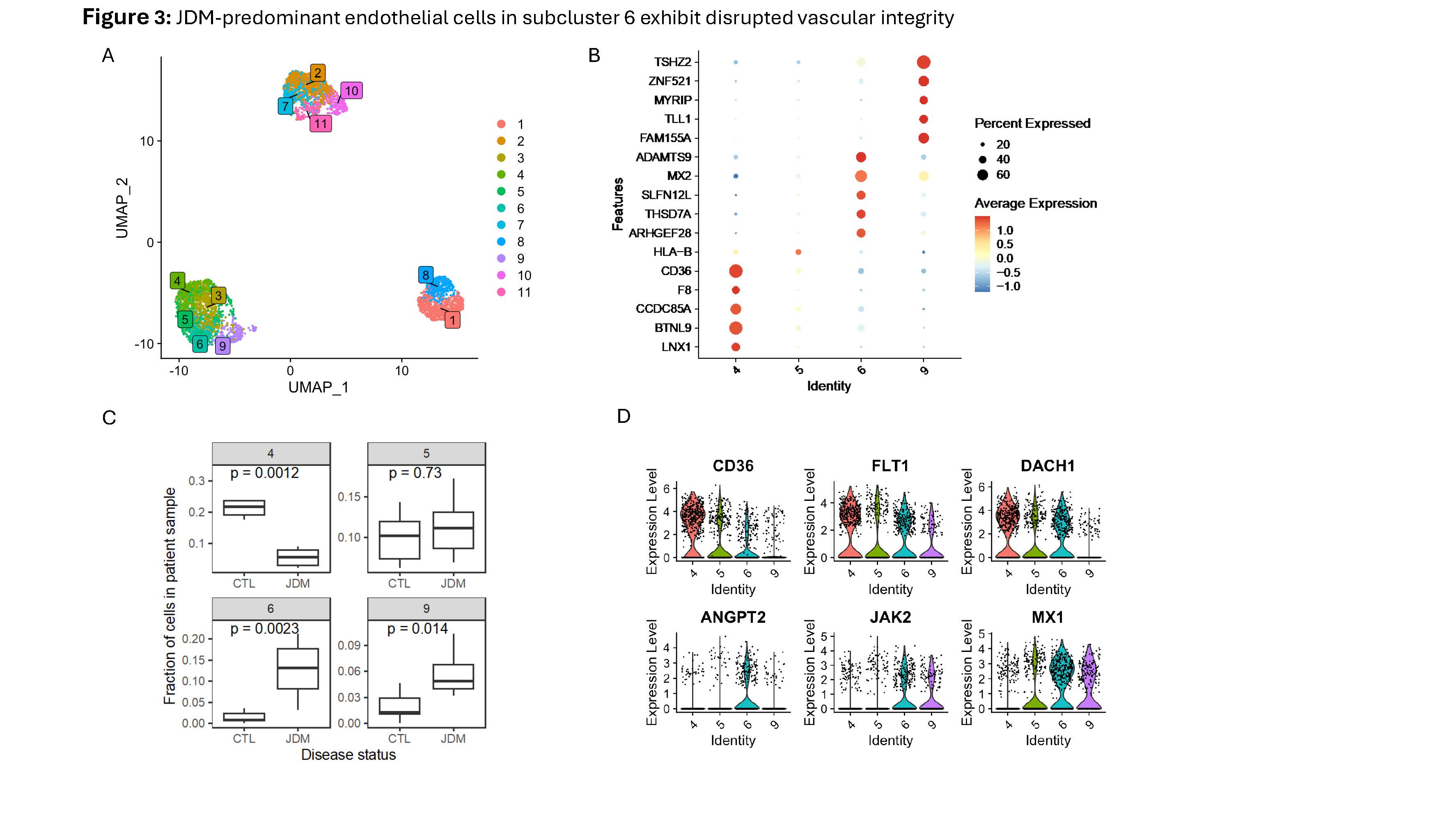Session Information
Session Type: Poster Session C
Session Time: 10:30AM-12:30PM
Background/Purpose: Juvenile dermatomyositis (JDM) is the most common idiopathic inflammatory myopathy in children, and it frequently follows a chronic disease course. Treatments are limited secondary to poor understanding of disease pathogenesis. Therefore, we utilized single-nuclear RNA-sequencing as an unbiased approach to uncover tissue-specific cellular drivers and dysregulated biological pathways in JDM muscle.
Methods: All JDM patients met 2017 EULAR/ACR classification criteria, and 5/6 were treatment-naïve at time of biopsy. Single nuclei were isolated from frozen muscle biopsies of n=6 JDM and n=6 controls (CTL). Samples were multiplexed, and RNA-sequencing was performed using the 10x Genomics Chromium platform. Ambient RNA was removed using SoupX, and Freemuxlet was used for genetic demultiplexing and doublet removal. Sequencing data was integrated using Harmony, and dimensional reduction and clustering was performed using the standard Seurat workflow. Published cell type specific marker genes were used to annotate cell clusters. Differential gene expression analysis was performed using Model-based Analysis of Single-cell Transcriptomics and cell type proportions were evaluated between JDM and CTL using Wilcoxon rank sum test.
Results: 42,581 nuclei were analyzed, which generated 20 unique clusters (Fig 1A) comprising 12 cell types (Fig 1B & 1C), including multiple myonuclei, endothelial cells (ECs), pericytes, fibroblasts and immune cells. In JDM, increased neuromuscular junction myonuclei and a trend toward fewer type 1 myonuclei (Fig 1D) were noted. While type II myonuclei exhibited predominantly downregulated pathways related to muscle differentiation and function and nitric oxide synthase (NOS) signaling, macrophages, T-cells and ECs displayed increased IFN, cell adhesion and apoptotic signaling. In type II myonuclei, JDM nuclei were overrepresented in cluster 2 compared to cluster 1 (Fig 2A, 2B & 2C), which was enriched for IFN and integrin-linked kinase signaling and class I MHC mediated antigen processing and presentation. NOS1, which is a critical regulator of oxygen delivery, muscle repair and metabolic regulation in type II fibers, was strikingly downregulated in cluster 2 (Fig 2D). IFI44L and ANKRD1, linked to IFN response and EC activation, showed increased expression in cluster 2 (Fig 2D). Given the vasculopathy of JDM, we performed sub-clustering of stromal cells (Fig 3A & 3B) to examine ECs. CTL-predominant ECs in subcluster 4 expressed higher levels of CD36, FLT1 and DACH1 (Fig 3C & 3D), which are key genes in regulation of vascular integrity, angiogenesis and EC migration. JDM-predominant ECs in subcluster 6 expressed a higher IFN signature (MX1 and JAK2) and increased angiopoietin 2 (ANGPT2) (Fig 3C & 3D), which can lead to disruption of vascular integrity.
Conclusion: Single nuclei muscle transcriptomics in JDM highlight that both resident tissue and immune cell types contribute to disease pathogenesis. In particular, type II muscle fibers and ECs demonstrate JDM-specific subpopulations with altered IFN, NOS and angiogenesis signaling. These data generate critical hypotheses to further investigate the vasculopathy, muscle inflammation and fatigue seen clinically in JDM.
To cite this abstract in AMA style:
Turnier J, Madubata C, Goudsmit C, Ferris S, Berthier C, Zheng Z, Matossian S, Dvergsten J, Wilkinson M, Wedderburn L, Morgan G, Pachman L, Lalancette C, Parker S, Heaton A, Kahlenberg J, Fragiadakis G, Neely J. Single-Nuclear RNA-Sequencing of Treatment Naïve JDM Muscle Highlights Dysregulated Vascular Integrity and Angiogenesis in Endothelial Cells and Decreased Nitric Oxide Synthase Signaling in Type II Muscle Fibers [abstract]. Arthritis Rheumatol. 2024; 76 (suppl 9). https://acrabstracts.org/abstract/single-nuclear-rna-sequencing-of-treatment-naive-jdm-muscle-highlights-dysregulated-vascular-integrity-and-angiogenesis-in-endothelial-cells-and-decreased-nitric-oxide-synthase-signaling-in-type-ii-mu/. Accessed .« Back to ACR Convergence 2024
ACR Meeting Abstracts - https://acrabstracts.org/abstract/single-nuclear-rna-sequencing-of-treatment-naive-jdm-muscle-highlights-dysregulated-vascular-integrity-and-angiogenesis-in-endothelial-cells-and-decreased-nitric-oxide-synthase-signaling-in-type-ii-mu/



